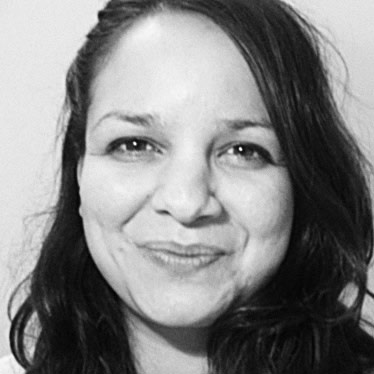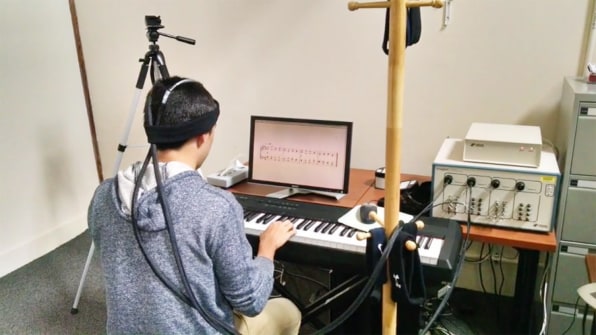Which Area of the Brain Do Skilled Readers Activate More Frequently When Reading?
Beste Yuksel could soon put a lot of piano teachers out of piece of work.
The Ph.D candidate at Tufts Academy in Massachusetts has created a tool that helps students larn the instrument faster and with more accuracy than they would under the watchful eye of a traditional teacher, or while practicing on their own. Called BACh, for Encephalon Automated Chorales (and an obvious nod to one of history's about prolific composers), the system has one major advantage over human teachers: Information technology tin can read your encephalon.

"BACh is an instance of where we hope the future of brain-computer interfaces become," Yuksel says. Before pursuing her Ph.D at Tufts, she start got two main's degrees, 1 in computer science and the other in neuroscience. Now she'south interested in where those ii topics intersect. "My hope is that brain-calculator interfaces are used by everybody every twenty-four hours, and that it helps their quality of life," she says.
The BACh organization measures something called "cerebral load," which is a fancy term for how much mental exertion is required to acquire something new. The traditional method for learning the piano is i hand at a fourth dimension. Once a student can get through a line on the right hand, they move on to the left hand. But at that place's no way to tell how difficult their brain has to piece of work to get through that line. Some people might breeze through information technology rapidly, and their cognitive load is depression, which means they're truly gear up to move on. Others may have to piece of work really hard, and then their cognitive load is heavy, and they're at gamble for mental exhaustion. "That could indicate that they're overloaded and you need to decrease the corporeality of information," Yuksel explains.

When we learn something new, we're kind of operating in the dark with regard to how well our brains are really arresting the data. We could overwork ourselves and not realize it. It's only when nosotros testify up for an exam or take to perform that new piece of music that nosotros know if all that practice really worked. "It'south very hard for people to exist self-reflective about their own cognitive country and workload," Yuksel says.
An observant teacher might be able to tell when a student is ready to larn new cloth, but a computer tin can practice it much amend by really peering inside their encephalon. BACh users clothing special sensors fastened to their foreheads that measure blood period in the prefrontal cortex, which serves as the brain's control centre for higher cognitive functions like multitasking, decision making, and curt-term retentiveness. "When y'all call up," Yuksel explains, "your heart pumps more blood and more oxygen to that part of the brain."
Based on blood menstruation, BACh can tell how hard a educatee's brain is working, and only releases a new line of music once the learner's cognitive load is light, indicating they've mastered the showtime line with ease. And so far, the technology proves really promising. In one study, people who learned new songs using BACh played more right notes and fabricated fewer mistakes than those participants learning on their own. They also played the piece faster than the command group. And these weren't experts—Yuksel only recruited beginners for the study.
"It's the first time we have this objective concrete measurement of cognitive load that helps people learn in real time," Yuksel says. Now she and her adviser, Robert Jacob, a professor of computer science, are working on using BACh to measure emotions as well as cerebral load. "For instance, if frustration or feet are high while workload is high, it could indicate they are overloaded," she says. "Then I would subtract the corporeality of information or offering to help."
While we've got some work to exercise before nosotros can plug our brains into a calculator and download data, Matrix-manner, Jacob envisions a future where our devices come with congenital-in mini-BACh systems that work with a wearable, and then students can track their own mental load. In fact, his colleagues in the electrical engineering department are already working on prototypes. "Imagine this attached to your telephone or Google Drinking glass," he says. "At that place's nothing preventing this. It's achievable."
For Yuksel, piano is just the starting time of many possible applications. She says BACh could be used to teach almost any new skill, from math to foreign language. "Y'all could design the system nonetheless you want," she says. "If yous were teaching little kids how to read, you lot could beginning with the letters of the alphabet and build onto ii-alphabetic character words. As long every bit it'southward a task that can exist cleaved down into different levels of difficulty, you can increase the difficulty as cerebral load falls below a certain threshold. You lot could design for little children upward to graduate-level electrical engineers. This organization is a showtime stride, but a powerful i."
Source: https://www.fastcompany.com/3056869/this-brain-reading-tool-can-teach-you-a-new-skill-in-no-time
0 Response to "Which Area of the Brain Do Skilled Readers Activate More Frequently When Reading?"
Post a Comment